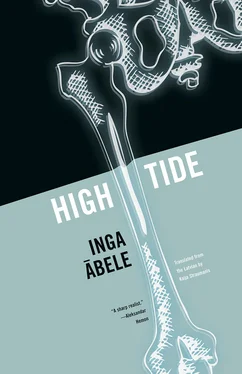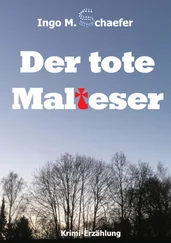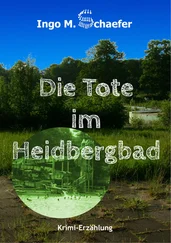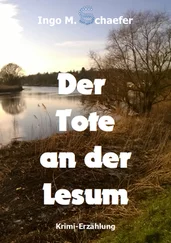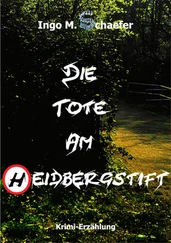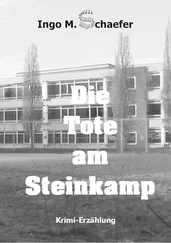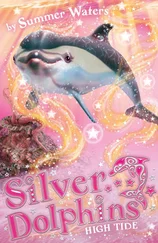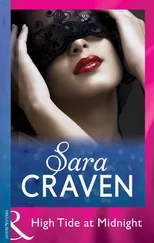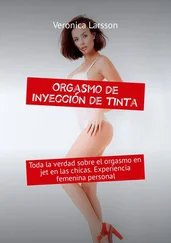Aksels rests his chin in his hand and looks at me thoughtfully. He’s stayed young. Beautiful, welcoming, and as cool as ice. My face already shows signs of aging. For a second I think about how different we are, but only for a second. All I want to do is turn my hands palms-up toward the sun and soak up this moment. To unfurl the flowers, shake out the pollen, let out the buds. Be like a sponge and absorb the impossible — the absence of time. With the scent of seaweed and the feel of another person’s gaze.
I ask flat out:
“What do you think? Is a person given only one love in their lifetime, or several?”
“What’s love?” he asks.
What’s love? The hot hand of the sun slides heavily down the back of my neck. The wind whips the shorter hairs at my temples. This world is my home. Here I choose a person who will observe me for many days and nights — is that love? I’m tired. Happy. Then… sad. With disheveled features, ugly, and content. Young. Middle-aged. And old. And someone wants to observe me. Even like this. As everything. Forever. Love. Maybe that’s an observation?
“Well… in spite of it all, we always find a way in life to be together for a few moments,” I say.
“Destiny,” Aksels jokes.
“The encyclopedia of life.”
“The abridged version.”
“Of pictures.”
“For kids.”
“What’s the point of it all?”
“Nothing,” I laugh. “Insomnia and lack of appetite. Movies and books.”
“A good metabolism.”
“Metabolism, of course. And that’s a lot. I don’t know about other worlds, but this planet only has one criterion — life.”
After that I ask:
“Aksels, can art be a cookbook? The living teaching the living is like the blind leading the blind.”
“Eh, that’s not true — if the living weren’t able to give the living any advice, there’d be a lot more dead people.”
Aksels smoothes his blonde hair with his hands, then stretches. His beautiful arms cut into the sky like lightning.
“Thanks for the tea,” he teases, feeling his pockets. He puts on his sunglasses; I’m clearly and starkly reflected in their black lenses. “I’ve got to go do my things.”
“Of course.”
He leaves, and in that moment the sun over the sea becomes slightly overcast. The sky grows muggy, as if someone has breathed onto a blue mirror.
Your absence. We’re strong; we have to unravel it all piece by piece.
Take care.
Thesedays Ieva spends a lot of time wandering the train tracks.
The tracks wind throughout Riga. Ieva likes the spots where they come together in thick clusters — by the Daugava Stadium, by the Matīss Prison, under the Gaisa Bridge. And she likes the spots where narrow, rusted tracks lead to nowhere. Where the buildings are falling apart, the factories are shut down, and the railway ties are separated by fields. There are a lot of places in Riga that look like World War II just ended.
Ieva likes them and isn’t afraid.
She wanders.
It’s a habit characteristic of living dangerously.
She has a dog and a child, and often gets into trouble with those train tracks. Because she takes the dog and her daughter with her when she goes walking. Her brother says no smart woman would do that. But Ieva isn’t a smart woman, that’s the thing. She’s not even a woman yet. She’s like a blind child with a seeing-eye kid and dog.
A blind child feeling around for a way out.
She likes to roam through desolation, where the city drops away — ditches, marshland, trenches, and construction sites. The outer limits. Where there are lakes like eyes and rivers like veins. Where the flesh of the earth is as thick as a fox’s coat — rust colored reeds and white splinters. Her daughter snaps reeds in half. The dog sniffs at something. Ieva watches the current. Their trio makes her think of bird watchers, or geologists in the desert. No one’s in a hurry.
They move as slowly as clouds that are seeing this world for the first time and don’t understand its hierarchy, can’t grasp what the most important things here are, what they should pay attention to.
Ieva wanders and doesn’t think; she hopes that, while she wanders, her thoughts sit in a room somewhere in her head and patch the shreds of her life back together stitch by stitch. While her thoughts are busy doing this, she wanders.
And someday her thoughts, those seamstresses, will wake her and present her with a new suit — her fixed life. Then she’ll finally settle down and stop wandering.
On their way back downtown, Ieva, her daughter, and the dog cross the iron bridge over the canal. So they don’t have to take the boring route to the Vidzeme highway. The water churns far below the beams, and her daughter throws pebbles into it.
At that moment a train crawls out of the woods just outside the city. They’re right in the middle of the bridge when the conductor sounds the horn. Ieva looks back. There’s no place to run. Her daughter is too young and the dog clueless — they won’t know how to flatten themselves against the rail for the train to pass.
Ieva doesn’t remember much more after that. She hoists her daughter under one arm, grabs the dog by its scruff and gallops toward the end of the bridge, leaps over the beams. They make it.
Then all three of them sink into the grass on the embankment. Her daughter reaches out to break off the tip of a reed. The dog, a little offended, licks the fur on its back.
As the train rushes past, its wind tears at her hair and clothes. Her thundering heart settles only once the train is out of sight.
Idiot! Who are you to cross over that bottomless pit and drag others along with you? Where’s your lighthouse, your beacon?
It’s died out.
Ieva rents a room on Ģertrūdes Street in the apartment of an old woman; a room with a view of absolutely nothing.
What is nothing? The airless shaft of the courtyard and the sagging windows of the adjacent building. A few clotheslines crisscross the sky. By turning a crank, you can raise your laundry up there, into the sun. And at night you reel it back into the dusk — dry, lightly cured by smog and the smell of car exhaust.
Now and then a man’s naked white ass comes into view in the brown frame of the window to the left of the central stairwell.
So is that something?
It reminds her more of nothing.
And Ieva’s room doesn’t have any luxuries like a clothesline with a crank. The bathroom is in the hallway. Her daughter pees in the sink. Some nights she gets the urge to do the same, but overcomes it.
The dog stands with its front paws on the windowsill between the flowerpots and freezes like sorrow in frost. He watches the birds.
The birds are crows. So are crows birds?
It reminds her more of nothing.
Ieva talks into a cellphone. Her hair is cut short. A lean, boyish face. She looks out the window at the once ornate, but now run down balconies of the building across the courtyard.
As she listens to the voice on the other end, she takes a dark violet men’s dress shirt from the back of the chair. The shirt has pale red stripes. She puts the phone down on the bed for a second. Presses the shirt to her chest and looks into the mirror on the wall.
She shakes her head as if she doubts her reflection. Then she picks up the phone and puts it back to her ear. There’s nothing but a disapproving silence. Then a voice firmly says:
“But you’re not even listening!”
Ieva says:
“Stop, Mom, I’m listening. I know it all. It’ll be fine.”
Her voice is carefree, but her face forms a painful expression as the last words leave her mouth. As if she were screaming in despair, howling without a sound.
Читать дальше
